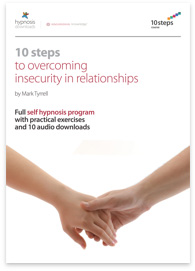How to Stop Self Sabotage in Relationships
8 Love-Destroying Behaviours You Must Avoid
 Many people sabotage their relationships in one way or another. It's actually a remarkably common human experience.
Many people sabotage their relationships in one way or another. It's actually a remarkably common human experience.Devina was angry with herself. "I'm doing it again!" she cried in exasperation.
"What?"
"Sabotaging my relationship? Why do I do this?"
A good question. It seemed as if my client would inevitably ruin anything good that would even begin to develop in the relationship department. Part of the reason for that was that she tried too hard to make it work. But there were other problems.
"I get so insecure! I look for signs it's not going to work, and it's like I believe it's destined to fail. Then it's like I try to ruin it. If I ruin it, then at least I have some control. I think it's going to fail, so I make it fail. I know it's really weird."
Devina sighed wearily. At 36, she no longer wanted it to be like this.
I could see why Devina saw her behaviour as weird. But it wasn't weird at all, at least not in the sense of being unusual. It's actually a remarkably common human experience. Many people sabotage their relationships in one way or another.
Of course, it takes two to tango, and you might think you've sabotaged the relationship when in fact it could have been headed for the rocks anyway. But that's not to say that we shouldn't try to avoid the kinds of behaviour that can make it more likely! Hopefully this piece will help you spot - and work on - relationship-sabotaging behaviours before it's too late.
But before we get going, there's something important to consider.
Sabotaging a relationship is often unconscious. Not everyone has the insight Devina did. We don't necessarily know what we're doing, and we don't usually mean to screw up when it comes to romance. But by thinking calmly and carefully about what you do in relationships, and considering whether any relationship-sabotaging behaviours seem familiar, you can become more purposeful in the way you approach your relationship.
I've worked with hundreds of relationship saboteurs over the years, and they all do similar things. I'm about to share with you some of the most common ways people sabotage their relationships. But of course, this is far from an exhaustive list.
Here's what not to do if you want to work for and not against your own relationship.
1. Don't play mind games
Playing relationship mind games can rot your relationship from the inside, almost before you've even gotten started. Believe it or not, people want to be with you, not some image or representation of you created to gain the 'upper hand'.
Let's look at a few common examples of mind games.
Testing
Obviously it's important to get to know someone as best we can before, and as, we enter into a relationship with them. We need to know they are safe and sane. But while it may seem natural to test someone's limits early on by 'treating them mean' or disrespectfully pushing boundaries, this is not an open and honest way to conduct a relationship. In fact, it can destroy it before it gets started.
Trying to make someone jealous can be a method of testing, as can playing hard to get.
Playing hard to get
Being purposefully aloof to get a reaction (rather than, say, out of fear of commitment) may seem preferable to being offputtingly eager early on, but it's still treating the relationship like a contest. And a contest can quickly degrade into a struggle, at which point people tend to just give up.
Research has found that aloofness is not as attractive in a partner as friendliness.1 Acting like you don't care is a risky game that may make the other person stop caring about you as the relationship starts to feel like too much hard work.
A behaviour that often ties in with playing hard to get is sending mixed messages.
Sending mixed messages
If one day you are really affectionate and keen and the next you seem bored and disinterested, and you are doing this as a tactic, don't! Some people may find it more exciting if their lover runs hot then cold, but many will run away because they just never know where they are with you.
Another behaviour that's easy to pile on top of the above tactics is 'gaslighting'.
Gaslighting
Playing mind games with someone and then acting as if they are the one with the problem when they seem confused or upset is particularly toxic. If you've seen the classic movie Gaslight, you'll understand where this term comes from: the male villain tries to convince his wife she's going mad by purposefully turning the gaslights down in their house then claiming it's all in her head!
Okay, so these kinds of manipulative mind games are obviously super-efficient ways of ruining a relationship. But what other behaviours do we need to avoid in order not to sabotage what could turn into something beautiful?
2. Don't try to make your partner jealous
This comes under the umbrella of mind games too, but it's so important it gets its own section. Trying to make your partner jealous can break the relationship apart because you make yourself appear untrustworthy. This is a clear lose/lose strategy. Either your partner sees you as someone who is inherently unfaithful, or they see you as someone who is manipulative.
Not a good look either way!
And the effects may not always be immediate. Flirting with others in front of your partner or trying to make them jealous in other ways can damage the relationship not only in the moment but even years down the track as resentment continues to fester.
If you want a long-term relationship, you need to consider the long-term effects of your behaviour. Even if you're only pretending to be interested in other people, the impressions you make in the early days may come back to haunt you both.
On the other hand, many people - and this was particularly true of Devina - need to relax more when it comes to romance. Trying to make your partner jealous or playing hard to get may not seem related to the next point, but it most certainly is.
3. Don't try too hard
Paradoxically, playing hard to get is a form of trying too hard. Relationships get sabotaged all the time for want of taking the foot off the gas a little in the early days.
Lovebombing is a term that means bombarding someone with so much attention, affection, and approval that they become overwhelmed. Cults do this to hook vulnerable people. Suddenly they're swept off their feet by all this wonderful attention. So while we shouldn't play hard to get, coming on too strong can also backfire if a person feels overwhelmed by it.
There are two problems with lovebombing in the early stages of a relationship:
- You may hook the person in, but now they will expect this level of attention from you all the time. The moment it slips, they may feel the relationship is dead and want to give up on it.
- It may smack of desperation; and desperation is, for many, a big turnoff.
Your relationship needs to be part of your and your partner's life - hopefully an important part, but not the whole raison d'être.
Lovebombing is one of the most obvious manifestations of trying too hard, but there are plenty of others, especially when the relationship has become established.
4. Don't overmonitor or interrogate
Don't treat your partner as some kind of therapy client, or worse still, an interrogation subject.
- "What are you thinking?"
- "You didn't smile when I suggested we go out next week!"
- "We need to talk meaningfully about..."
Not every 'issue' needs to be earnestly 'explored' and endlessly dissected. No one likes to feel like they've signed up to some ongoing interrogation, with every thought and action being analyzed. Where's the fun in that? And yes, fun is very important to the health of a relationship.2
Couples who know what not to talk about tend to be the happiest.3 Constantly shining super-bright lights into a cave won't necessarily make it more beautiful.
Some monitoring is necessary, but so is a sense of freedom, spontaneity, and fun. Overanalysis is often driven by emotional insecurity, but the fallout of this stress may be damage to the relationship.
Relationships need to be fun as well as heavy. In fact, they should seldom be heavy.
Yes, if there is something really important going on then you might need to 'explore' it with your partner. But treating a relationship like one big explorative therapy session may cause unhealthy dependency and unbalance the reciprocal and equal exchange of attention that is so vital to the health of any relationship. Or it may send the other person running for the hills just so they can feel safe to have a private thought or two.
Alongside overmonitoring we often find another classic relationship corroder.
5. Don't be clingy
Insecurity is a big issue in millions of relationships. Why? Because relationships matter so much to us. But clinginess stemming from relationship insecurity can backfire terribly.
Research has found that expectation of rejection is often a self-fulfilling prophecy - that is, it eventually produces the very rejection we fear.4
Constantly asking someone what they are thinking or wanting to know where they are all the time is a form of control. Pretty soon your partner can feel emotionally distanced from you. After all, you don't feel connected to someone who constantly doubts you. Intimacy is a sense of togetherness and shared reality. Doubt and distrust are the exact opposite to that.
If your insecurity makes your partner feel hemmed in, restricted, and unable to 'breathe', it's no wonder it can become self-fulfilling.
Give your partner space. Work on jealousy if that's been an issue for you. Don't try to manipulate them through game playing. And remember, nothing in life is 100% secure. We can't demand total security in any aspect of our lives, and it's a real developmental step when we learn not to.
This next one may be familiar to you as well. Perhaps you've been guilty of it yourself, had it done to you, or seen other people do it in their relationships.
6. Don't feel you have to change them
There's an old joke that when a man marries a woman he hopes she won't change, but when a woman meets a man she hopes he will change.
Sure, in a healthy relationship people help one another develop, and people naturally change over time, hopefully in good ways. But actively seeking to mould your partner to fit your expectations can make them feel little short of tyrannized. The (perhaps) unspoken message is: You are no good as you are!
If your partner comes to feel that you don't value them because everything they do is 'wrong', not surprisingly they may start to prefer to spend time with those who do seem to value them for who they actually are.
Trying to change what someone wears, who their friends are, and even what they can and can't say is a form of control freakery. If they have terrible habits then, okay, we might help them out of those. But otherwise we need to help them fulfil their life on their terms and be who they are.
This shouldn't be hard. After all, why did you fall for them if they are so flawed?
Constantly criticizing may be another manifestation of the desire to colonise your partner, as it were, by turning them into a version of yourself rather than letting them be themselves. Frequent criticism has been shown to be one of the most toxic behaviours in relationships and is a big predictor of relationship breakdown.5
Some partners feel they're trying to 'improve' their spouse by constantly pointing out what's wrong with them. But even if the intentions are good, the consequences certainly aren't. And criticizing partners publicly can be especially humiliating (for both partners).
So avoid excessive criticism... but there's another side to that coin, too.
7. Don't be defensive
No one likes to feel that they are treading on eggshells - that they can't relax with you for fear that they may say the 'wrong' thing or that you may take something they said in a different way to how it was intended.
Devina said that when she was in a relationship she would get really defensive and feel as if she was being attacked even when she wasn't. This was a case of 'once bitten, twice shy'. She had been so excessively criticized by her parents and her former husband that she had gotten used to defending herself, and now she was doing it even when she didn't need to.
If someone is defensive and fires back strongly at you when you were just trying to be nice or saying something pretty neutral, you will feel misunderstood. And feeling misunderstood drives away a sense of connection. Intimacy can certainly disappear when someone is overly critical, but it also dissolves when someone is chronically defensive.
Take time out to relax more, stop assuming the worst, and don't bite someone's head off when all they want is to talk to you. Frequent defensiveness is poison to a relationship.
And lastly...
8. Don't get complacent
It's easy to stop seeing the person we are with. Not literally, of course, but familiarity breeds indifference if we are not careful. When you sense someone has started taking you for granted, it's easy to feel like the relationship has lost its heart.
If you love your partner and want to be with them, remember that, and focus on what you can be grateful for in the relationship. Too many good relationships rot and crumble through a lack of expressed appreciation.
Okay, so complacency can be damaging. But what about emotional factors that you might bring to a relationship?
9. Don't let low self-esteem affect your relationship
Having really low self esteem can, inadvertently, damage a relationship.
If you tend towards low self-esteem, you may start to feel contemptuous of the person who has chosen to be with you. It's as if they must have something wrong with them for choosing such 'damaged goods'.
Or you may feel pathetically grateful to them and feel that if they left, you'd never find anyone else. As if they are doing you a massive favour just by being with you. If this is the case, your self-esteem needs to improve in order to stabilize the relationship.
Remember, we are all here for a relatively short time. If your relationship is a good one, then the simple fact that you are together in this miniscule part of space and time is, in itself, amazing.
No matter how much relationship sabotage you might have done in the past, I want you to remember something.
Reasons to be hopeful
Now that we've covered some of the most common ways we sabotage our relationships, you might spot some of these relationship corroders in the person you are with, and if so then talking about them might help.
But if you have been doing them yourself - and there's no shame in that, as most of us do engage in some of these behaviours some of the time - then rest assured that you can change them to behaviours and feelings that will help you and your relationship to thrive. You can change, and so can your relationships. There is plenty of reason for hope, even if you've had dozens of 'disastrous' relationships.
Devina, the client I mentioned, had been engaging in many if not all of these relationship-sabotaging behaviours at different points in her relationships. Over time we worked on the very worst ones - insecurity, clinginess, jealousy, trying too hard - and each time I saw her she seemed happier.
Her relationship was, and still is, going from strength to strength.
10 Steps to Overcome Insecurity in Relationships course
Despite how much you love your partner, are you worried you're driving them away?...
References
- https://journals.sagepub.com/doi/10.1111/j.1467-9280.2007.01897.x
- https://extension.usu.edu/files-ou/publications/newsletter/FC_Relationships_2011-04pr.pdf, http://citeseerx.ist.psu.edu/viewdoc/download?doi=10.1.1.464.5766&rep=rep1&type=pdf
- According to famous relationship researcher and psychologist John Gottman, PhD, “Couples who avoid saying every critical thought when discussing touchy topics are consistently the happiest.” See: https://www.psychologies.co.uk/love/what-happy-couples-know.html
- https://psycnet.apa.org/buy/1998-10511-019
- According (again!) to John Gottman, PhD, frequent criticism is one of the biggest predictors of divorce in married couples. See: https://www.gottman.com/blog/c-is-for-contempt-criticism/







